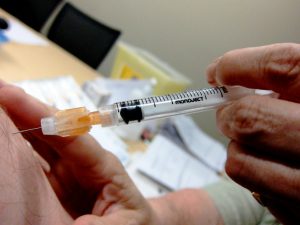This week brought the news that Indonesia had penned an agreement with the pharmaceutical firm AstraZeneca to supply the country with 100 million coronavirus vaccines next year.
During a two-day trip to London, Indonesian Foreign Minister Retno Marsudi signed a letter of intent with the United Kingdom-based company for the procurement of the vaccine, currently in the final stage of human trials. “The first delivery is expected to be made in the first half of 2021 and will be carried out gradually,” Retno told a news conference on October 14.
The announcement comes as Indonesia struggles to limit a surge in COVID-19 infections that has seen the country repeatedly post new daily records of infections over the past month. On October 15, the country reported 4,411 new coronavirus cases, taking its tally to 349,160, passing the Philippines as the Southeast Asian nation with the highest number of cases in Southeast Asia. Indonesia also reported 112 new COVID-19 deaths, bringing its total fatalities to 12,268, by far the highest in the region. Given the paucity of testing in Indonesia, many public health experts believe these figures could underestimate the true spread of the disease. The same day, the Indonesian Medical Association announced that 136 doctors had lost their lives to COVID-19 since March.
While the government of President Joko “Jokowi” Widodo has come under harsh criticism for its poor handling of the COVID-19 pandemic, it has moved all its chips onto securing priority access to a vaccine. The AstraZeneca deal comes as Indonesia announced that it is taking steps to become the second country outside China to allow emergency use of one of China’s experimental vaccine candidates.
According to the Wall Street Journal, Indonesia’s government intends to procure 18 million doses by the end of the year from three Chinese firms – Sinovac Biotech Ltd., Sinopharm and CanSino Biologics Inc. – whose vaccines are still undergoing clinical trials in various parts of the world. If approved by the Indonesian authorities, these doses would be given to health care workers, police and soldiers under an emergency dispensation.
Sinovac is also testing its vaccine candidate within Indonesia, and in August announced that it had partnered with Indonesia’s PT Bio Farma to produce at least 40 million doses of the vaccine before March 2021, should it prove viable.
During a visit to China on October 9, Indonesian special envoy Luhut Binsar Panjaitan and Chinese Foreign Minister Wang Yi agreed to boost cooperation with Indonesia in fighting the coronavirus, including backing Indonesia as a hub for vaccine production. “China is willing to work with Indonesia on vaccine research, production and distribution, and support exchanges of relevant departments and medical institutes to help ensure access to affordable vaccines across the region and around the world,” Wang reportedly said.
With many vaccine candidates likely to result in dead ends, Indonesia appears to be spreading its risk by securing access to as many as possible – and on both sides of the burgeoning “vaccine divide” between China, which is trying to use access to vaccines to increase its influence in the developing world, and rival Western powers including the United States.
Ben Bland, the director of the Southeast Asia Program at Sydney’s Low Institute of International Policy, noted on Twitter that Indonesia’s promiscuous vaccine ventures seemed to reflect its traditional “independent and active” foreign policy. First formulated in the 1950s, this policy has been marked by a tendency to balance between outside power blocs, while remaining aloof of both. Despite its manifold failures in handling the controlling the spread of COVID-19, “independent and active” may well end up serving Indonesia well as it enters the race to gain access to an effective vaccine.

































